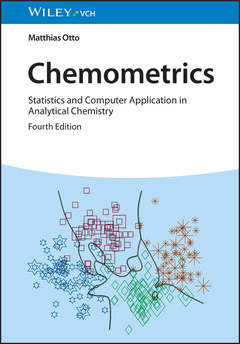Description
Chemometrics (4th Ed.)
Statistics and Computer Application in Analytical Chemistry
Author: Otto Matthias
Language: English
Subjects for Chemometrics:
· 17x24.4 cm · Paperback
Description
/li>Contents
/li>Biography
/li>
Explore chemometrics from basic statistics to the latest artificial intelligence and neural network developments in this new edition
Chemometrics is an area of study combining chemistry and mathematics. It governs the interpretation of data generated by chemical analysis, and its growth as a subfield promises to streamline and revolutionize analytical chemistry.
Chemometrics has long been the leading introductory textbook in this subject. Beginning with an introduction to the statistical-mathematical evaluation of chemical measurements, it leads readers through modern chemometric approaches in a pedagogically sound and highly readable style. Now fully updated to reflect the latest research and applications of this exciting discipline, it provides essential tools for a new generation of analytical chemists.
Readers of the fourth edition of Chemometrics will also find:
- New or expanded treatment of subjects such as deep learning, ANNOVA simultaneous component analysis, instrumental data output, and more
- Detailed discussion of approaches to signal processing, design and optimization of experiments, pattern recognition and classification, and many other areas
- Balance of theoretical and practical knowledge to enable rapid application of key techniques
Chemometrics is ideal for advanced students in chemistry, analytical chemistry, pharmaceutical chemistry, biochemistry, or related subjects, and as a useful reference for practicing researchers and laboratory professionals.
Preface vii
List of Abbreviations xi
1 What is Chemometrics? 1
1.1 The Computer-Based Laboratory 3
1.2 Statistics and Data Interpretation 11
1.3 Computer-Based Information Systems/Artificial Intelligence 12
General Reading 13
Questions and Problems 13
2 Basic Statistics 15
2.1 Descriptive Statistics 16
2.2 Statistical Tests 28
2.3 Analysis of Variance 45
General Reading 56
Questions and Problems 57
3 Signal Processing and Time Series Analysis 61
3.1 Signal Processing 62
3.2 Time Series Analysis 91
General Reading 99
Questions and Problems 100
4 Optimization and Experimental Design 101
4.1 Systematic Optimization 102
4.2 Objective Functions and Factors 103
4.3 Experimental Design and Response Surface Methods 111
4.4 Sequential Optimization: Simplex Method 135
General Reading 142
Questions and Problems 142
5 Pattern Recognition and Classification 145
5.1 Preprocessing of Data 147
5.2 Unsupervised Methods 151
5.3 Supervised Methods 198
General Reading 226
Questions and Problems 227
6 Modeling 231
6.1 Univariate Linear Regression 232
6.2 Multiple Linear Regression 249
6.3 Nonlinear Methods 281
General Reading 293
Questions and Problems 293
7 Analytical Databases 295
7.1 Representation of Analytical Information 296
7.2 Library Search 309
7.3 Simulation of Spectra 316
General Reading 318
Questions and Problems 318
8 Knowledge Processing and Soft Computing 321
8.1 Artificial Intelligence and Expert Systems 321
8.2 Neural Networks 330
8.3 Fuzzy Theory 352
8.4 Genetic Algorithms and Other Global Search Strategies 365
General Reading 375
Questions and Problems 377
9 Quality Assurance and Good Laboratory Practice 379
9.1 Validation and Quality Control 380
9.2 Accreditation and Good Laboratory Practice 384
General Reading 386
Questions and Problems 386
Appendix 387
Index 403
Matthias Otto is Professor Emeritus of Analytical Chemistry at the TU Bergakademie Freiberg in Germany. He conducted his studies at the University of Leipzig before accepting a role as lecturer in Freiberg, Germany, where he was appointed full Professor in 1987. He has taught almost all aspects of analytical chemistry, mainly within the curricula of chemistry, applied sciences, and geoecology, and has organized courses in basic and advanced chemometrics.
These books may interest you

Chemometrics in Excel 98.99 €



